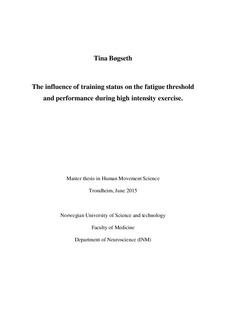The influence of training status on the fatigue threshold and performance during high intensity exercise.
| dc.contributor.author | Bøgseth, Tina | |
| dc.date.accessioned | 2015-09-18T11:08:33Z | |
| dc.date.available | 2015-09-18T11:08:33Z | |
| dc.date.issued | 2015 | |
| dc.identifier.uri | http://hdl.handle.net/11250/300737 | |
| dc.description.abstract | The influence of training status on the fatigue threshold and performance during high intensity exercise were studied in six endurance trained cyclists and seven recreationally students during 1 min anaerobic TT and 10 min aerobic TT. The peripheral fatigue was expressed as reduction in the potentiated single quadriceps twitch force (Qtw-pot) from baseline from pre to post cycling exercise measured with supra maximal femoral nerve electro stimulation. The central fatigue was estimated from voluntary activation (VA) using the superimposed twitch technique. The central motor drive (CMD) was estimated from quadriceps EMG (mean RMS normM). On different days, both groups performed two maximal cycle tests in the 1 min TT and the 10 min TT where each TT was repeated two times as test 1 and test 2 with neuromuscular assessment between tests. The reduction in Qtw-pot from baseline was not significant different from test 1 to test 2 (P<0.07) and indicate the fatigue threshold. The training status influence on the fatigue threshold and performance was the same for anaerobic 1 min TT and aerobic 10 min TT. The endurance-trained group had a lower reduction in Qtw-pot from baseline that means a lower fatigue level on the fatigue threshold (P<0.01), a higher CMD (P<0.05) and higher power output (P<0.01) than the recreational group. The 1 min TT had a higher reduction in Qtw-pot and a higher level of fatigue on the fatigue threshold than the 10 min TT. The central fatigue increase from test 1 to test 2 and had higher influence on the aerobic 10 min TT than the anaerobic 1 min TT. The results show that quadriceps fatigue related to biochemical changes in the muscle and central fatigue related to decrease in VA was responsible for the fatigue threshold and decrease in performance. These findings show that training status have an influence on the fatigue threshold and performance where higher training status leads to higher fatigue threshold and performance. | nb_NO |
| dc.language.iso | eng | nb_NO |
| dc.publisher | NTNU | nb_NO |
| dc.title | The influence of training status on the fatigue threshold and performance during high intensity exercise. | nb_NO |
| dc.type | Master thesis | nb_NO |
